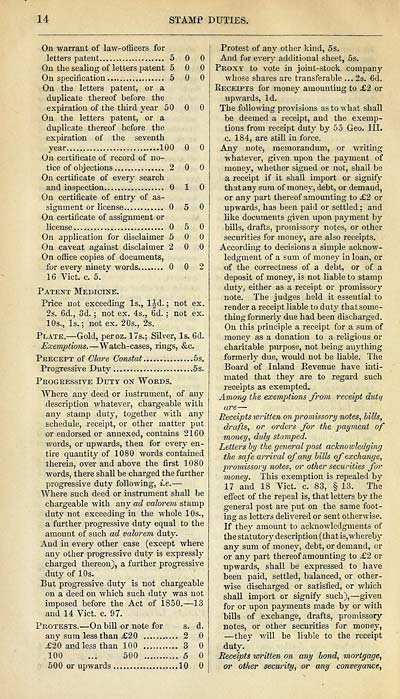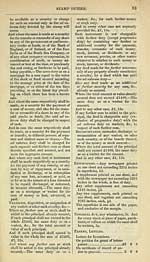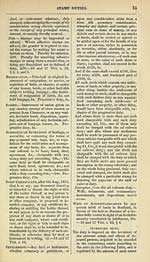Download files
Complete book:
Individual page:
Thumbnail gallery: Grid view | List view

14
STAMP DUTIES.
On warrant of law-officers for
letters patent 5
On the sealing of letters patent 5
On specification 5
On the letters patent, or a
duplicate thereof before the
expiration of the third year 50
On the letters patent, or a
duplicate thereof before the
expiration of the seventh
year 100
On certificate of record of no-
tice of objections 2
On certificate of every search
and inspection 10
On certificate of entry of as-
signment or license 5
On certificate of assignment or
license 5
On application for disclaimer 5
On caveat against disclaimer 2
On office copies of documents,
for every ninety words 2
16 Vict. c. 5.
Patent Medicine.
Price not exceeding Is., 1 Jd. ; not ex.
2s. 6d., 3d. ; not ex. 4s., 6d. ; not ex.
10s., Is. ; not ex. 20s., 2s.
Plate. — Gold, peroz. 17s.; Silver, Is. 6d.
Exemptions. — Watch-cases, rings, &c.
Precept of Clare Constat 5s.
Progressive Duty 5s.
Progressive Duty on Words.
Where any deed or instrument, of any
description whatever, chargeable with
any stamp duty, together with any
schedule, receipt, or other matter put
or endorsed or annexed, contains 2160
words, or upwards, then for every en-
tire quantity of 1080 words contained
therein, over and above the first 1080
words, there shall be charged the further
progressive duty following, i.e. —
Where such deed or instrument shall be
chargeable with any ad valorem stamp
duty not exceeding in the whole 10s.,
a further progressive duty equal to the
amount of such ad valorem duty.
And in every other case (except where
any other progressive duty is expressly
charged thereon), a further progressive
duty of 10s.
But progressive duty is not chargeable
on a deed on which such duty was not
imposed before the Act of 1850. — 13
and 14 Vict. c. 97.
Protests. — On bill or note for s. d.
any sum less than £20 2
£20 and less than 100 3
100 ... 500 5
500 or upwards 10
Protest of any other kind, 5s.
And for every additional sheet, 5s.
Proxy to vote in joint-stock company
whose shares are transferable ... 2s. 6d.
Receipts for money amounting to £2 or
upwards, Id.
The following provisions as to what shall
be deemed a receipt, and the exemp-
tions from receipt duty by 55 Geo. III.
c. 184, are still in force.
Any note, memorandum, or writing
whatever, given upon the paj'ment of
money, whether signed or not, shall be
a receipt if it shall import or signify
that any sum of money, debt, or demaud,
or any part thereof amounting to £2 or
upwards, has been paid or settled ; and
like documents given upon payment by
bills, drafts, promissory notes, or other
securities for money, are also receipts.
According to decisions a simple acknow-
ledgment of a sum of money in loan, or
of the correctness of a debt, or of a
deposit of money, is not liable to stamp
duty, either as a receipt or promissory
note. The judges held it essential to
render a receipt liable to duty that some-
thing formerly due had been discharged.
On this principle a receipt for a sum of
money as a donation to a religious or
charitable purpose, not being anything
formerly due, would not be liable. The
Board of Inland Revenue have inti-
mated that they are to regard such
receipts as exempted.
Among the exemptions from receipt ditty
are —
Receipts written on promissory notes, hills,
drafts, or orders for the payment of
money, duly stamped.
Lettersby the general post acknowledging
the safe arrival of any bills of exchange,
promissory notes, or other securities for
■money. This exemption is repealed by
17 and 18 Vict. c. 83, § 13. The
effect of the repeal is, that letters by the
general post are put on the same foot-
ing as letters delivered or sent otherwise.
If they amount to acknowledgments of
the statutory description (that is, whereby
any sum of money, debt, or demand, or
or any part thereof amounting to £2 or
upwards, shall be expressed to have
been paid, settled, balanced, or other-
wise discharged or satisfied, or which
shall import or signify such),— given
for or upon payments made by or with
bills of exchange, drafts, promissory
notes, or other securities for money,
— they will be liable to the receipt
duty.
Receipts written on any bond, mortgage,
or other security, or any conveyance,
STAMP DUTIES.
On warrant of law-officers for
letters patent 5
On the sealing of letters patent 5
On specification 5
On the letters patent, or a
duplicate thereof before the
expiration of the third year 50
On the letters patent, or a
duplicate thereof before the
expiration of the seventh
year 100
On certificate of record of no-
tice of objections 2
On certificate of every search
and inspection 10
On certificate of entry of as-
signment or license 5
On certificate of assignment or
license 5
On application for disclaimer 5
On caveat against disclaimer 2
On office copies of documents,
for every ninety words 2
16 Vict. c. 5.
Patent Medicine.
Price not exceeding Is., 1 Jd. ; not ex.
2s. 6d., 3d. ; not ex. 4s., 6d. ; not ex.
10s., Is. ; not ex. 20s., 2s.
Plate. — Gold, peroz. 17s.; Silver, Is. 6d.
Exemptions. — Watch-cases, rings, &c.
Precept of Clare Constat 5s.
Progressive Duty 5s.
Progressive Duty on Words.
Where any deed or instrument, of any
description whatever, chargeable with
any stamp duty, together with any
schedule, receipt, or other matter put
or endorsed or annexed, contains 2160
words, or upwards, then for every en-
tire quantity of 1080 words contained
therein, over and above the first 1080
words, there shall be charged the further
progressive duty following, i.e. —
Where such deed or instrument shall be
chargeable with any ad valorem stamp
duty not exceeding in the whole 10s.,
a further progressive duty equal to the
amount of such ad valorem duty.
And in every other case (except where
any other progressive duty is expressly
charged thereon), a further progressive
duty of 10s.
But progressive duty is not chargeable
on a deed on which such duty was not
imposed before the Act of 1850. — 13
and 14 Vict. c. 97.
Protests. — On bill or note for s. d.
any sum less than £20 2
£20 and less than 100 3
100 ... 500 5
500 or upwards 10
Protest of any other kind, 5s.
And for every additional sheet, 5s.
Proxy to vote in joint-stock company
whose shares are transferable ... 2s. 6d.
Receipts for money amounting to £2 or
upwards, Id.
The following provisions as to what shall
be deemed a receipt, and the exemp-
tions from receipt duty by 55 Geo. III.
c. 184, are still in force.
Any note, memorandum, or writing
whatever, given upon the paj'ment of
money, whether signed or not, shall be
a receipt if it shall import or signify
that any sum of money, debt, or demaud,
or any part thereof amounting to £2 or
upwards, has been paid or settled ; and
like documents given upon payment by
bills, drafts, promissory notes, or other
securities for money, are also receipts.
According to decisions a simple acknow-
ledgment of a sum of money in loan, or
of the correctness of a debt, or of a
deposit of money, is not liable to stamp
duty, either as a receipt or promissory
note. The judges held it essential to
render a receipt liable to duty that some-
thing formerly due had been discharged.
On this principle a receipt for a sum of
money as a donation to a religious or
charitable purpose, not being anything
formerly due, would not be liable. The
Board of Inland Revenue have inti-
mated that they are to regard such
receipts as exempted.
Among the exemptions from receipt ditty
are —
Receipts written on promissory notes, hills,
drafts, or orders for the payment of
money, duly stamped.
Lettersby the general post acknowledging
the safe arrival of any bills of exchange,
promissory notes, or other securities for
■money. This exemption is repealed by
17 and 18 Vict. c. 83, § 13. The
effect of the repeal is, that letters by the
general post are put on the same foot-
ing as letters delivered or sent otherwise.
If they amount to acknowledgments of
the statutory description (that is, whereby
any sum of money, debt, or demand, or
or any part thereof amounting to £2 or
upwards, shall be expressed to have
been paid, settled, balanced, or other-
wise discharged or satisfied, or which
shall import or signify such),— given
for or upon payments made by or with
bills of exchange, drafts, promissory
notes, or other securities for money,
— they will be liable to the receipt
duty.
Receipts written on any bond, mortgage,
or other security, or any conveyance,
Set display mode to: Large image | Transcription
Images and transcriptions on this page, including medium image downloads, may be used under the Creative Commons Attribution 4.0 International Licence unless otherwise stated. ![]()
| Scottish Post Office Directories > Towns > Glasgow > Post-Office annual Glasgow directory > 1855-1856 > (30) |
|---|
| Permanent URL | https://digital.nls.uk/84130819 |
|---|
| Description | Directories of individual Scottish towns and their suburbs. |
|---|
| Description | Around 700 Scottish directories published annually by the Post Office or private publishers between 1773 and 1911. Most of Scotland covered, with a focus on Edinburgh, Glasgow, Dundee and Aberdeen. Most volumes include a general directory (A-Z by surname), street directory (A-Z by street) and trade directory (A-Z by trade). |
|---|


